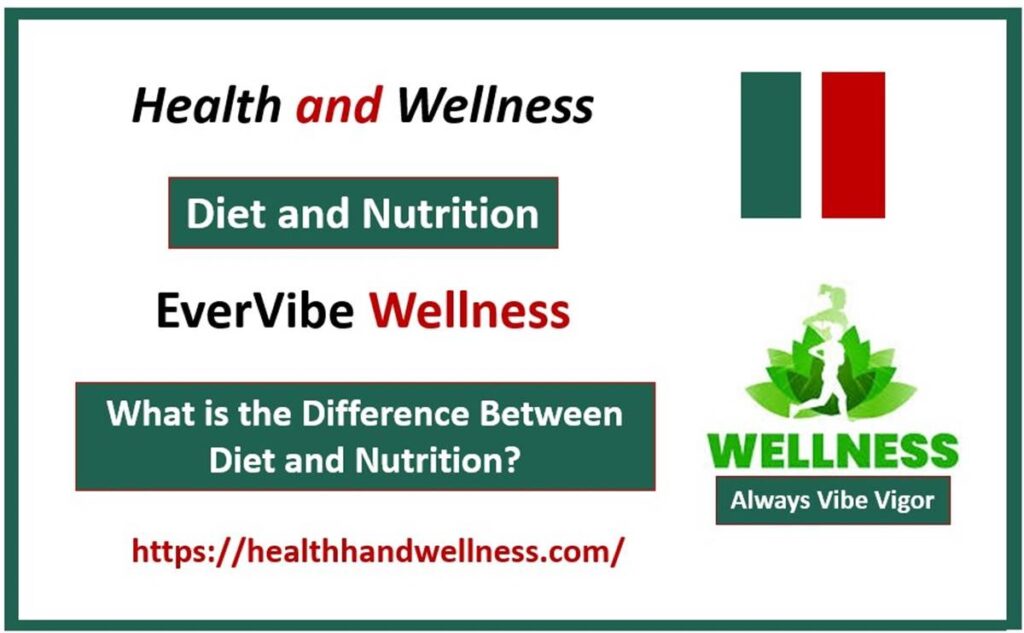This article explores What is the Difference Between Diet and Nutrition, highlighting their definitions, significance, and roles in maintaining a healthy lifestyle. Learn key differences, common misconceptions, and practical tips for a balanced approach to living a healthier life.
Introduction
In today’s fast-paced world, maintaining good health has become a priority for many. Terms like “diet” and “nutrition” are frequently used but often misunderstood or confused. While they are closely related, they represent different aspects of our eating habits and health.
Understanding the difference between diet and nutrition is essential for creating a balanced lifestyle. This article will clarify these concepts and provide practical tips to help you optimize your health. What is the Difference Between Diet and Nutrition

What is Diet?
The term diet generally refers to the specific foods and beverages a person consumes regularly. It can be as simple as what someone eats daily or as structured as a specific meal plan designed for weight loss, health improvement, or medical conditions. What is the Difference Between Diet and Nutrition
Types of Diets
- Balanced Diet: Includes all essential nutrients in proper proportions.
- Restrictive Diets: Such as keto, paleo, or vegan diets, which exclude certain food groups.
- Medical Diets: Prescribed for conditions like diabetes or heart disease.
Diet often implies a short-term effort to achieve specific goals, such as weight loss or muscle gain. However, a person’s diet also reflects cultural, social, and personal preferences. What is the Difference Between Diet and Nutrition
What is Nutrition
Nutrition, on the other hand, is the science that studies how the body uses food to function, grow, and repair itself. It focuses on the nutrients present in the food such as carbohydrates, proteins, fats, vitamins, and minerals and their role in maintaining overall health.
Key Components of Nutrition
- Macronutrients: Carbohydrates, proteins, and fats provide energy and structure.
- Micronutrients: Vitamins and minerals support various biochemical functions.
- Water: Essential for hydration and metabolic processes. What is the Difference Between Diet and Nutrition
Unlike diet, nutrition is not just about what you eat but also about the body’s ability to absorb and utilize those nutrients effectively. What is the Difference Between Diet and Nutrition
Key Differences Between Diet and Nutrition
Understanding how diet and nutrition differ is crucial to making informed health decisions:
| Aspect | Diet | Nutrition |
|---|---|---|
| Definition | The food and drink you consume daily. | The study of nutrients and their impact on health. |
| Focus | What you eat. | How your body uses what you eat. |
| Scope | Short-term and goal-oriented. | Long-term and health-oriented. |
| Application | Often influenced by trends and fads. | Based on scientific evidence. |
| Goal | Weight control, fitness, or lifestyle. | Overall health and well-being. |
How Diet and Nutrition Work Together
While diet and nutrition are distinct, they are interconnected. A proper diet ensures the intake of essential nutrients, which in turn supports good nutrition. For example:
- Eating a diet rich in whole foods like fruits, vegetables, and lean proteins ensures adequate nutrition.
- A poor diet, such as one high in processed foods, can lead to nutritional deficiencies.
Focusing on both aspects is key to maintaining a balanced and healthy life. What is the Difference Between Diet and Nutrition
Common Misconceptions
Many people hold misconceptions about diet and nutrition, leading to confusion and unhealthy practices. Let’s address some common myths:
- Myth: Dieting Means Starvation
Starving yourself or skipping meals is not a sustainable or healthy way to lose weight. It can harm your metabolism and lead to nutritional deficiencies. - Myth: All Fats Are Bad
Not all fats are unhealthy. Healthy fats, like those found in nuts and avocados, are essential for brain and heart health. What is the Difference Between Diet and Nutrition - Myth: Supplements Can Replace Food
While supplements can fill some gaps, they cannot replace the variety of nutrients found in whole foods. What is the Difference Between Diet and Nutrition - Myth: Healthy Eating Is Too Expensive
Planning meals, buying seasonal produce, and cooking at home can make healthy eating affordable.
Practical Tips for a Balanced Approach
To maintain a healthy balance between diet and nutrition, consider the following tips:
- Focus on Whole Foods
Prioritize fruits, vegetables, lean proteins, and whole grains in your meals. - Practice Portion Control
Avoid overeating by serving appropriate portion sizes. - Stay Hydrated
Drink plenty of water to support digestion and overall health. - Limit Processed Foods
Reduce consumption of sugary, salty, and heavily processed foods. - Balance Macronutrients
Ensure your meals include a good mix of carbs, proteins, and fats. - Be Mindful of Micronutrients
Include foods rich in vitamins and minerals, such as leafy greens and nuts. - Seek Professional Guidance
Consult a nutritionist or dietitian for personalized advice. - Practice Consistency
Long-term habits are more effective than short-term diets.
Diet and nutrition are fundamental components of a healthy lifestyle, but they are not the same. Your diet is the food you consume, while nutrition focuses on how that food nourishes your body. By understanding the key differences and how they work together, you can make informed choices to improve your health and well-being.
Remember, the goal is not just to follow a “diet” but to prioritize nutrition for sustainable health. Adopt a balanced approach, and you’ll be on your way to a healthier, happier life.